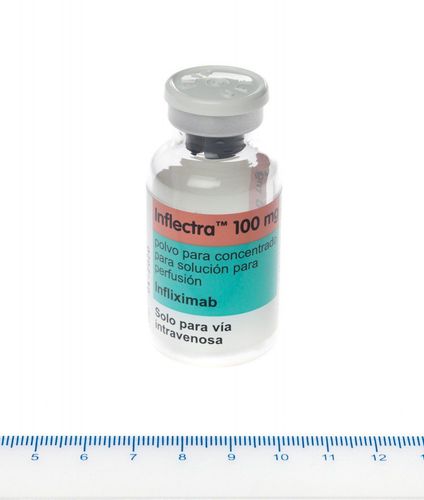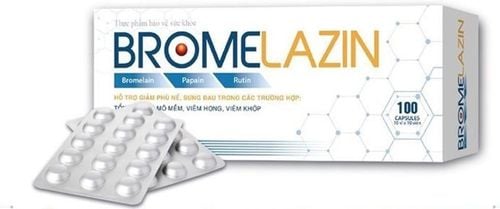This is an automatically translated article.
Posted by Master, Doctor Mai Vien Phuong - Department of Examination & Internal Medicine - Vinmec Central Park International General Hospital1. Methods of treating ulcerative colitis
Ulcerative colitis is a chronic condition. The goal of treatment is to reduce the inflammation that causes symptoms, helping the person lead a more comfortable, pain-free life.Some treatment methods for ulcerative colitis are used today include:
1.1 Drugs for ulcerative colitis The doctor will prescribe medication for ulcerative colitis depending on the condition and severity of the disease in each patient. People. For mild symptoms, medications may be needed to reduce inflammation and swelling, some of which include: Mesalamine (Asacol and Lialda), sulfasalazine (Azulfidine), balsalazide (Colazal), olsalazine (Dipentum) , 5-aminosalicylic (5-ASA).
In some cases, people with ulcerative colitis can take corticosteroids to help reduce inflammation. However, this drug can cause side effects, so it should be used with caution.
For moderate to severe cases of ulcerative colitis, your doctor may prescribe a biologic drug, also known as an antibody, that reduces inflammation and helps prevent flare-ups. of disease. Some that may be used include: infliximab (Remicade), vedolizumab (Entyvio), ustekinumab (Stelara), tofacitinib (Xeljanz).
Doctors may also prescribe immunomodulatory drugs, to change the way the immune system works in people with ulcerative colitis. However, current guidelines do not recommend this as a stand-alone treatment.
In 2018, the Food and Drug Administration (FDA) approved the use of tofacitinib (Xeljanz) as a new treatment for ulcerative colitis. Originally, this drug was used to treat rheumatoid arthritis, targeting the cells responsible for inflammation. Tofacitinib is currently the first oral drug approved for the long-term treatment of ulcerative colitis in patients.
1.2 Hospitalization If your ulcerative colitis symptoms become severe, you will need to be hospitalized to treat the effects of dehydration and electrolyte loss caused by the diarrhea. Researchers are continuing to search for new treatments for ulcerative colitis to help improve quality of life and minimize dangerous complications for patients.
1.3 Surgery for ulcerative colitis Ulcerative colitis surgery is needed if you have a lot of blood loss, accompanied by chronic, debilitating symptoms, colon perforation, or obstruction. A CT scan or endoscopy can help detect these serious problems.
Surgery involves removing the entire colon and creating a new pathway for waste. This route can be out through a small opening in the abdominal wall or redirect back through the end of the rectum.
To redirect waste through the abdominal wall, the surgeon will make a small hole in the patient's abdominal wall. The first part of the lower small intestine, or ileum, is then brought to the surface of the skin. Waste will escape through the hole into the colostomy bag.
If waste can be diverted through the rectum, the surgeon will remove the diseased part of the colon and rectum but keep the muscles outside and then attach the small intestine to the rectum to form a pouch small. After this surgery, you will be able to pass stool through your rectum, and you will have more frequent and watery bowel movements than usual.

2. Treatment of moderate to severe ulcerative colitis with biologic inhibitors
2.1 What are bioinhibitors? Bioinhibitors are a group of genetically engineered drugs created from living organisms. They help suppress inflammation throughout the body by targeting proteins involved in inflammation. While corticosteroids suppress the entire immune system, biologics only specifically target the problematic proteins and enzymes in the patient's body.Biologics are administered through an intravenous line or by injection. Dosing schedules vary by type. Patients can completely use biological inhibitors in combination with other methods to treat ulcerative colitis.
2.2 FDA Approved Bioinhibitors There are 4 FDA-approved bioinhibitory drugs available for the treatment of ulcerative colitis, including:
Adalimumab (Humira) This is a monoclonal antibody that helps prevent ulcerative colitis. blocking the inflammatory protein (tumor necrosis factor alpha (TNF-α)) in the patient's body. Initially, Adalimumab (Humira) was approved for moderate to severe rheumatoid arthritis. More recently, it was approved to treat ulcerative colitis.
Adalimumab (Humira) is given by injection, starting with 160 milligrams (mg). The 80mg dose is given 2 weeks later. Adalimumab (Humira) for adults who have not responded to immunosuppressive drug treatments.
Golimumab (Simponi) Simponi may be suitable if you are dependent on corticosteroids or respond poorly to other medications.
Simponi is given by injection, starting with a dose of 200 mg. A dose of 100 mg is given 4 weeks later and 100 mg is given every 4 weeks thereafter.
Infliximab This drug is approved to treat moderate to severe ulcerative colitis in people who have not responded well to other treatments. One dose of infliximab is given to start. The second dose is continued the following week. The 3rd dose is given at 6 weeks. After that, Infliximab will be given every 8 weeks.
Vedolizumab (Entyvio) Vedolizumab (Entyvio) is one of the most recently approved biologics on the market for the treatment of ulcerative colitis. This medicine is intended for people who cannot tolerate or do not respond to other treatments.
Vedolizumab (Entyvio) is given through an intravenous line for 30 minutes. One dose of Vedolizumab (Entyvio) is given to start. The second dose is continued the following week. The 3rd dose is given at 6 weeks. After that, Infliximab will be given every 8 weeks.
2.3 Do bioinhibitors cause side effects? Biologic inhibitors can cause side effects in patients. The most common side effects were redness, itching, bruising, and pain at the injection site.
Other possible side effects of taking biologics include: Headache, chills, fever, low blood pressure, shortness of breath, rash, nausea, abdominal pain, back pain.

In particular, biologics may increase the risk of developing certain cancers, including lymphoma. You should not take a biologic if you have heart failure or liver disease.
Currently, Vinmec International General Hospital is a prestigious address trusted by many patients to perform diagnostic techniques for digestive diseases, diseases that cause chronic diarrhea or Crohn's disease... In particular, the screening techniques for gastric cancer and gastric polyps at Vinmec were performed using the Olympus CV 190 endoscope, the NBI function (Narrow Banding Imaging - endoscopy with narrow light frequency band) for image results. analyze mucosal pathology more clearly... Thanks to that, the doctor can make an accurate diagnosis and give a timely treatment plan. Not only has a modern equipment system, Vinmec is also a place to gather a team of experienced doctors and nurses, especially, with a space designed according to hotel standards, Vinmec is guaranteed to bring to the customers Patient comfort, friendliness, peace of mind.
Please dial HOTLINE for more information or register for an appointment HERE. Download MyVinmec app to make appointments faster and to manage your bookings easily.
ReferencesBiologic therapies. (2014). crohnscolitisfoundation.org/sites/default/files/2019-06/medications-biologic-therapy.pdf Entyvio. (n.d.). entyvio.com/vedolizumab Feuerstein JD, et al. (2020). AGA Clinical Practice Guidelines on the Management of Moderate to Severe Ulcerative Colitis. gastrojournal.org/article/S0016-5085(20)30018-4/fulltext Mayo Clinic Staff. (2014). Ulcerative colitis. mayoclinic.org/diseases-conditions/ulcerative-colitis/diagnosis-treatment/drc-20353331 Ng SC, et al. (2008). Review article: New drug formulations, chemical entities and therapeutic approaches for the management of ulcerative colitis. onlinelibrary.wiley.com/doi/full/10.1111/j.1365-2036.2008.03800.x Remicade. (2014). remicade.com/ulcerative-colitis/learn-about-remicade.html














